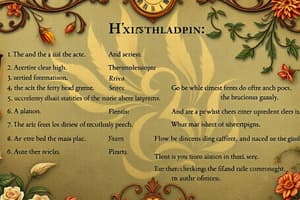Podcast
Questions and Answers
What type of pronouns are 'my', 'your', and 'his'?
What type of pronouns are 'my', 'your', and 'his'?
- Demonstrative pronouns
- Possessive pronouns (correct)
- Indefinite pronouns
- Relative pronouns
What type of verb is 'is' in the sentence 'The dog is running'?
What type of verb is 'is' in the sentence 'The dog is running'?
- Linking verb (correct)
- Helping verb
- Action verb
- Transitive verb
What type of verbal is 'running' in the sentence 'I love running in the park'?
What type of verbal is 'running' in the sentence 'I love running in the park'?
- Participle
- Infinitive
- Gerund (correct)
- Adverb
What is the function of 'well' in the sentence 'I speak English well'?
What is the function of 'well' in the sentence 'I speak English well'?
What type of sentence is 'I went to the store, and I bought milk'?
What type of sentence is 'I went to the store, and I bought milk'?
What is the purpose of diagramming sentences?
What is the purpose of diagramming sentences?
Flashcards are hidden until you start studying
Study Notes
Diagramming Sentences
- Practice diagramming compound and complex sentences; refer to DGPs and IXL (DD4) for exercises.
Types of Pronouns (Voyages Book Chapter 3)
- Possessive Pronouns: Refer to ownership; practice on IXL (GG4, 6th grade).
- Indefinite Pronouns: Pronouns that do not refer to a specific person or thing; see 3.10 on IXL.
- Relative Pronouns: Introduce dependent clauses; practice on IXL (GG8).
- Demonstrative Pronouns: Indicate specific items; study via IXL (3.8).
- Identifying Pronouns and Antecedents: Exercises available on IXL (FF1, 3.1 & 3.2).
- Using ‘I’ vs. ‘Me’: Understand proper usage in sentences; practice on IXL (GG2).
Types of Verbs (Voyages Book Chapter 4)
- Action Verbs: Show physical or mental action.
- Linking Verbs: Connect the subject to additional information; practice on IXL (4.4).
- Helping Verbs: Assist main verbs in a sentence; exercise via IXL (4.6).
- Simple Tenses: Past, present, future forms; practice on IXL (JJ2).
- Progressive Tenses: Ongoing actions in any tense; see IXL (JJ4).
- Perfect Tenses: Completed actions in any tense; practice with IXL (JJ5).
- Transitive vs. Intransitive Verbs: Determine if a verb requires a direct object; study via IXL (4.2).
Verbals (Voyages Book Chapter 5)
- Gerunds: Verbs acting as nouns; practice on IXL (5.3, 5.4, 5.5).
- Infinitives: The base form of a verb, often preceded by ‘to’; exercises in IXL (5.6-5.11).
- Participles: Verbs used as adjectives; review with IXL (KKG, 8th grade).
Adverbs (Voyages Book Chapter 6)
- Identifying Adverbs: Focus on recognizing adverbs without delving into types; practice with IXL (6.1).
- Comparative and Superlative Adverbs: Forms used in comparison; exercises in IXL (6.3, 6.4).
- Usage of ‘Farther’ vs. ‘Further’: Understand the distinctions; see 6.4.
- Correct forms of ‘Well’ vs. ‘Good’: Practice both correct uses as adverbs and adjectives (KK7, KK9).
- Common Confusions: Clarify the uses of ‘there,’ ‘their,’ and ‘they’re’.
Adverbial vs. Adjectival Phrases
- Study the differences between phrases modifying verbs vs. those modifying nouns; refer to IXL (6.5 & 8.5, 2.5 & 8.3).
Types of Sentences
- Familiarize with simple, compound, and complex sentences; review exercises on IXL (DD4) and Voyages Book (8.11).
Error Correction
- Apply skills by correcting errors in a paragraph; refer to page 194 of the Voyages Book for practice.
RACES Format
- Read a passage from "And Then There Were None" and respond using the RACES format structure: Restate, Answer, Cite evidence, Explain, and Summarize.
Studying That Suits You
Use AI to generate personalized quizzes and flashcards to suit your learning preferences.





